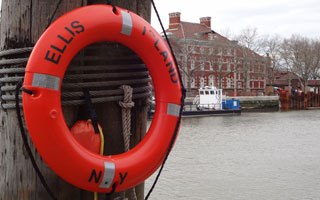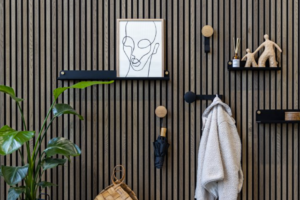 As a psychologist I believe that we can’t underestimate the power of integration and living with others. We can study racism all we want, and learn about it, try to understand it, try to eliminate it, but nothing helps us more than meeting a Jewish person and seeing that he does not have horns (as many non-Jews have believed and still believe),
As a psychologist I believe that we can’t underestimate the power of integration and living with others. We can study racism all we want, and learn about it, try to understand it, try to eliminate it, but nothing helps us more than meeting a Jewish person and seeing that he does not have horns (as many non-Jews have believed and still believe),
or seeing that a Mexican immigrant is not a criminal (in fact, studies show that immigrant neighborhoods have less crime, and it’s the next generation, that which is assimilated into American culture, that causes an uptick in crime in these areas. My guess is that it’s the poverty inherent in many immigrant neighborhoods that leads the next generation into crime). We dehumanize the “other” as a way to justify our feelings and any mistreatment of them, which is how leaders promote genocide, by describing the “enemy” or “other” as subhuman, as an insect, as a “savage.” But having a gay coworker and realizing he is “normal” or that the Black neighbor is “OK with me” helps us to generalize to other people in these groups and stop seeing it as an “us” and “them.” But while we look at refugees from the Middle East not as similar to refugees of other times from other places, but as “them,” we lose the humanity and compassion that should come with seeing a father holding his child who has drowned trying to escape an unsafe world. A television show with solid Black or other minority characters can start to chip away at the bigotry and stereotypes that we struggle with as a society. While Florida Evans raised her family in a housing project, working hard to make ends meet, George Jefferson showed us that Blacks could work hard and be financially prosperous, living in a “deluxe apartment” and even having a maid. Ricky Ricardo, even while perpetuating some stereotypes of the hot-headed Latino also showed us that a Latino immigrant could be married to America’s sweetheart while living in luxurious digs and running a business. And the current highest paid television actor, male or female, is a Colombian immigrant who plays up her goofy, fiery Latina persona and accentuates how well she looks in tight dresses. Latina immigrants right here in our community see someone from their own background making tens of millions and may feel they can get there too. We have a Black family in the White House, showing children that you don’t have to be White to be president.
But we can’t really keep making progress without dialogues. When I worked in a school district that was mostly minority students, predominantly Haitian, I tried to talk with the children so we could learn from each other. So I might have three or four kids in my office and the conversation would go like this: “The holidays are coming. What does your family eat on those days? What do you do?” and then we’d talk about the various menus that each family put together for Christmas or some other holiday. I’d talk about childhood memories of my grandmother making pizzas at midnight on New Year’s Eve (because the Italian feast we had finished two hours ago was not enough). Some children might talk about Jamaican meat patties. Others about collard greens. Some about ox tails. Others about Irish soda bread. And yet another might tell us about what his family made on Rosh Hashanah. I loved working with those kids, and I love living and working in Sleepy Hollow where I hear a handful of different languages being spoken as I take my ten-minute walk back and forth to my office. But even here in our little river towns, questions about the “best” school districts are often synonymous with “the ones with the fewest immigrants and minorities.” Sad, and painful to admit, but it’s certainly true. When our districts are rated, the percentage of students on free or reduced lunch is a factor. When your parents moved you to New York and hardly speak English and are mowing lawns or cleaning houses to get by, you are going to qualify for subsidized lunch. That should have no impact on the school district’s ranking, but it does, and it factors into people’s decisions about where to live. Even if not intentional prejudice, it does make one school more desirable than others, with bigotry as a byproduct. Yes, the poorer district may have fewer resources, but does anyone really think that the vast majority of Westchester school districts are anything but excellent in the scheme of things?
We need to stop and listen to others and not stick with our own agendas. Many people have responded to the Black Lives Matter movement with “All lives matter” or “Police lives matter” comments. All of this is true. But the BLM movement is trying to highlight that certain groups in our society have lived at a disadvantage for years and that these people matter too, not that the other people don’t matter. We need to listen when it’s pointed out that 150 years since the Emancipation Proclamation and 50 years since the Civil Rights Act it’s still an aberration when a talented and hard-working Black actress wins an Emmy. We shouldn’t even be discussing if the Confederate Flag has a racist history (it does). And we need to be alarmed when seven years after comments such as “I can’t believe we elected a Black president” (he’s biracial by the way), we have a Black candidate disparaging Muslims. A generation ago Ben Carson didn’t have a chance at being a GOP candidate. Colin Powell reportedly never ran because he was afraid for his and his family’s safety if a Black man became president. How soon Carson forgets this and immediately makes blanket statements about a Muslim’s lack of qualifications for elected office. Many people reading this probably remember what some felt about Kennedy and his Catholicism when he ran for office. But when it’s a new group, and in particular if it’s a group we have some mistrust in for some reason, we don’t think about what our group went through trying to gain acceptance, we think about how much we fear and hate this new group, now we’re the “us,” even if we were the “them” not so long ago. As I write this it’s a Muslim holiday and apparently the NYC schools were closed. A thread on Facebook caused a reaction in me as someone talked about what a “disgrace” it was to close schools for a “terrorist holiday.” It was not too long ago that this person’s family would have been called some choice things because their names ended in vowels. We can’t be so far removed from that situation that we see it as acceptable to do the same to others. As I said, we are all immigrants here, whether in 1620 or 2015. If the Navajo felt as some of us do, I would not be writing this today, in fact I probably wouldn’t have been born, as my ancestors would never have moved from Calabria, Naples, and Sparta to mix their genes and become me.
Xenophobia will probably never go away. It is most likely ingrained in our Darwinian wiring, as we needed to be fearful of others when we had no protection except a cave or a buffalo-skin tent. Being wary of something different alerts us to changes in our environment that may or may not be worth noting. But being alert to threats to our safety doesn’t include a hair-trigger reaction when someone “different” moves in across the street. As I have learned in over 25 years of studying the human psyche, we are more alike than different, and most people act in one of about six different ways. When we take the time to learn about each other, suddenly there are more of us in the “us” and fewer of “them.” Yes, change is scary, and I think that having a biracial president with a Muslim name, having LGBTQ issues front and center all of a sudden, and other changes are disruptive to some people, and it takes a while to get used to this. Archie Bunker, the prototypical bigot, was such a wonderful character because he was reacting to change, the radical ‘60s, the confusion he had about where his country was going. Let’s try not to emulate Archie but rather embrace the change. We were all that outsider at one time, whether because we looked different, couldn’t speak the language, prayed differently, or whatever. We found like-minded people to live near and created neighborhoods where people came from the same backgrounds and understood us, and that’s fine. But we don’t learn from that. We learn from saying to our neighbor who cooks, speaks, or prays differently, “Hey, what are you doing over there? Would you mind showing me?” Most of us are happy to talk about where we come from, and once we learn about the similarities, fear chips away a bit. When there’s more “us” there’s less xenophobia. When we’re more accustomed to each other, there’s less anxiety. All of this is good. What’s bad, quite frankly, is having politicians on a national stage spewing hate and being not only excused for it, but gaining votes. That’s not what this country was built on. That’s not why our families all came here.
Barbara Kapetanakes, Psy.D. practices child, adult, and family psychotherapy in Sleepy Hollow.






